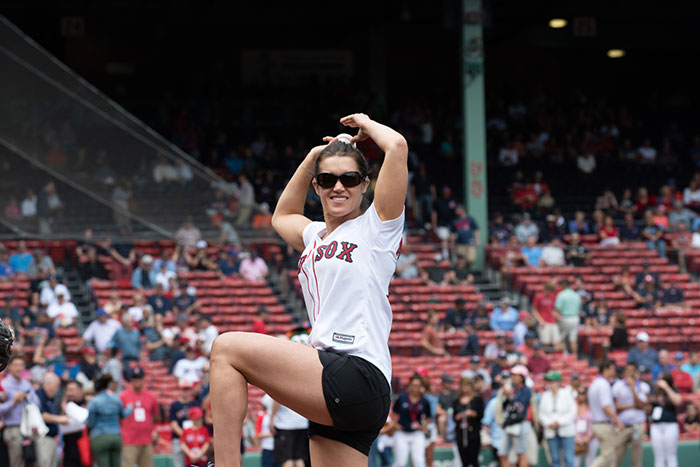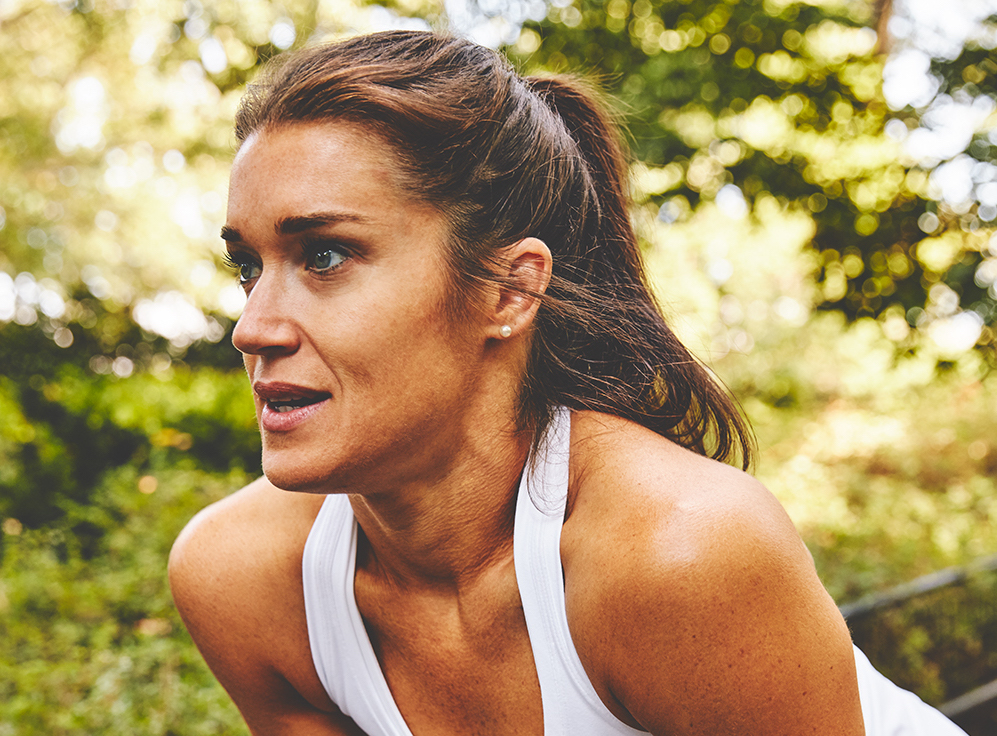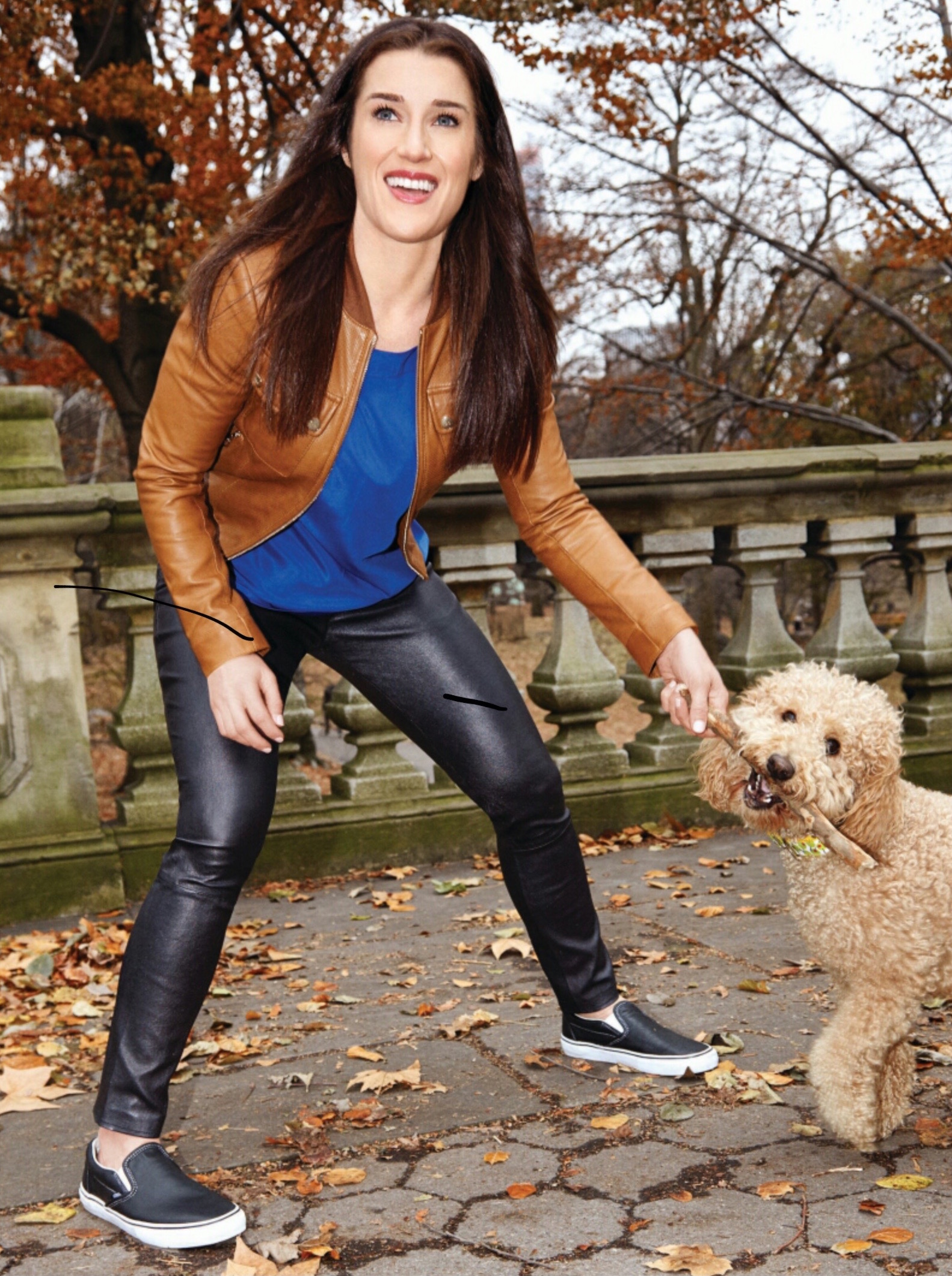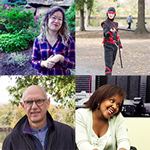Faces Behind the Screen: Rebecca Alexander
Quick Links
<< Return to all “Faces Behind the Screen” stories

Rebecca Alexander is an author, psychotherapist, fitness instructor, and keynote speaker. She’s accomplished a great deal in her life: summited Mt. Kilimanjaro, earned two master degrees from Columbia University, and wrote a memoir titled Not Fade Away.
Amidst her vivacious spirit and unrelenting energy, Rebecca is almost completely deaf and blind due to a condition called Usher Syndrome. That has never stopped her from pursuing her goals, though, and she wants everyone to know that she’s only human, too.
“I think that sometimes people look at someone like me and think that I’m invincible, and I’m not. The only difference is that I really allow people to know that this is who I am, that I’m going both deaf and blind. Most importantly, I’m not ashamed of it.”
Below, Rebecca shares her experience with having Usher Syndrome, touches on the importance of web accessibility, and speaks to the joy she feels when helping others.
What lead you down your career path?
REBECCA ALEXANDER: Initially when I went to school, I wanted to do something in public health. I was hoping to do work overseas, maybe work in the Peace Corps or do something in a francophone African country. I always loved French when I was growing up. I’ve always loved languages.
We really all have to help each other to make our lives meaningful and worthwhile.
As both my vision and hearing loss continued to progress, I realized that I had to be realistic about what would be sustainable for me for the long term.
One thing I always enjoyed doing was helping people. There’s, to me, no better feeling than having a sense of being a part of something bigger and part of the community. I think that helping people makes me feel like I’m a part of something bigger […] we really all have to help each other to make our lives meaningful and worthwhile.
I always used to read memoirs when I was growing up. I always found so much strength and resilience in reading about the human condition and the human spirit. That made me realize that being a therapist was probably the next best thing for me, in fact, it turned out to be the best thing that I could have done for myself.
What inspired you to write a memoir about your life experience?
REBECCA ALEXANDER: There was this story that was published about me in New York Magazine, I think this was in like 2008. A literary agent read it, approached me and said, ‘I really think you should write a memoir.’ I thought, what on earth does a 28-year-old have any business writing a memoir for?
Nobody had written about what it was like to have Usher syndrome.
Maybe three or four years later, I did a Spin-a-thon. In our inaugural year, we raised $110,000 for that event, and we were also very fortunate to be written up in The New York Times. That same literary agent happened to come across the article, and he approached me again. He said, ‘Now do you think you would be willing to write a memoir?’ I said, yeah, I do think that there’s a lot that I could say that could potentially be helpful to other people, and that could be cathartic. Nobody had written about what it was like to have Usher syndrome.
What lead you to live such an active lifestyle?
REBECCA ALEXANDER: I always liked sports when I was younger. I was the only girl with brothers, and my brothers were always really, really good athletes. I was a really good athlete, too. I always was trying to keep up with them.
I was told I was never going to walk properly again. That was really my first true experience with what it felt like to be a person with a disability.
I was actually in a very serious accident when I was 18. I broke just about everything in my body and was in a wheelchair for four months and had to completely rehabilitate myself. I was told I was never going to walk properly again. That was really my first true experience with what it felt like to be a person with a disability.
I think that after my accident, there was so much rehabilitation and physical therapy and occupational therapy involved that that was how I learned how important it is to physically take care of yourself, so that became a lifestyle for me.
Another part of it is that when you have a condition that is completely out of your control when you’re losing your vision and your hearing, there really is nothing I can do about it. I can’t change it. I can stop it. But I can take care of myself. And I can strengthen other parts of my body to the best of my ability.
Part Two

What is your story of being diagnosed with Usher Syndrome?
REBECCA ALEXANDER: I was first diagnosed with retinitis pigmentosa (RP). We knew that I had hearing loss when I was younger, and we thought that that was because I had ear infections when I was growing up. We didn’t quite know why it was that I had the hearing loss. We thought that it was just a side effect of having so many ear infections.
They said, “Rebecca, you have something called Usher Syndrome.”
It wasn’t until I was a sophomore at the University of Michigan [that] I woke up one morning and experienced really loud ringing in my ears, which is the most common symptom for people who experience hearing loss, tinnitus. After about a week or so, it hadn’t gone away, so I decided to go and get it checked out.
I went to an otolaryngologist. They ran some tests and they said, “Rebecca, you have something called Usher Syndrome.”
What is Usher Syndrome?
REBECCA ALEXANDER: Usher syndrome is the leading genetic cause of combined deaf-blindness in this country and around the world. We believe that there are about 400,000 people affected of which 1% has actually been identified in terms of their genotype.
There are three different types of Usher syndrome. I have Usher syndrome type 3 […]and type 3 is the mildest onset of both progressive vision and hearing loss, which means that your hearing loss and your vision loss usually start a little bit later, but they’re both progressively deteriorating.
How does having Usher Syndrome affect you?
REBECCA ALEXANDER: A normally sighted person has about 180 degrees of vision when looking straight ahead, and I have about somewhere between 10 to 15 degrees with my central-most vision.
There are not […] even […] five minutes that go by that I’m not reminded or really humbled by my circumstances.
I didn’t really start wearing hearings aids until I was about 18 or so. I was cochlear implanted on my right side in 2013, and I was cochlear implanted on my left side last December of 2017. And so without my cochlear implants now, I am completely deaf. I could have a marching band come through the room, and unless I hear the vibration of it, I wouldn’t hear it, so […] when I say that I’m deaf, I mean it.
So [having Usher Syndrome] really is a part of everything that I do in my life. There are not […] even […] five minutes that go by that I’m not reminded or really humbled by my circumstances.
Part Three

What are your thoughts on web accessibility?
REBECCA ALEXANDER: I make sure that […] we have the descriptive captioning [on social media] so that any picture we have we make sure whatever’s in the photo is described for the visually impaired or for the blind, so that can be read to them by the voiceover on their phones.
There’s not a fluidity yet to being a visually-impaired person and being able to go online and find things easily.
Oftentimes, they have those little parts that they don’t want you to see [in an email], like ‘unsubscribe,’ in very faint gray print or light blueprint. For a visually-impaired person, it’s very difficult to find that, and it’s just an added burden to the process. I think that there should be an option to make everything bold if you need to.
[Web accessibility] certainly has gotten better. It’s not perfect by any means, and it certainly has a long way to go. There’s not a fluidity yet to being a visually-impaired person and being able to go online and find things easily. I do think that there’s a long way to go.That’s the visual part, the hearing part is the captioning. That’s something that there should be more of. If you’re going to post [a video], there should be the ability to have it captioned because even for people who aren’t deaf or [hard-of-hearing], it can be difficult to hear videos.
What do you wish that fully-sighted and fully-hearing people could know about your experience?
REBECCA ALEXANDER: Oftentimes when people publish stories about me and Usher syndrome, the first thing that they say is, ‘Rebecca Alexander is being robbed of her vision and hearing.’ [They’ll say] ‘People who suffer from Usher syndrome.’ Certainly, there is a lot of suffering involved. Life is suffering. We are all suffering in some form. To be honest, going both deaf and blind, I feel like I have a much more fulfilling and meaningful life than many people who are fully sighted and [have] full hearing.
The last thing I want from people is pity. The last thing I want from people is to see me as suffering. What I want people to have is a sense of what they have, of how fortunate they are. Instead of focusing on all the things that aren’t going right in their lives, focusing on all the things that are going right, focusing on all the things that they can do and not the things that they can’t do. There are so many of us who work twice as hard to be able to accomplish what somebody who is fully sighted and fully hearing can do.
What does helping others mean to you?
REBECCA ALEXANDER: I think that part of what’s so important about being in a helping profession and helping others just in our everyday lives is that it reminds us that we matter. There’s nothing more important in this life than to know that we matter. And one of the best ways that we can recognize and realize that is by offering to help other people. Because when we offer to help somebody else or when somebody asks us for help and we give it to them, it reminds us that who we are and what we do in this world matters. And I think that’s incredibly important.
Any final thoughts for our readers?
REBECCA ALEXANDER: People…see me as this cheerleader, this role model, if you want to call it that, for people with disabilities. What they don’t see is that my experience is very similar to others…I allowed myself to cry. I allowed myself to mourn […] what I have lost. In doing that, I’m able to move forward and be fully present for what I’m dealing with in front of me.
Having a condition like this requires you to accept your vulnerability; it’s a very, very difficult thing to do.
I think that so many people try to avoid what’s happening to them […] all in an effort to avoid what they’re most afraid of and that is their own vulnerability. Having a condition like this requires you to accept your vulnerability; it’s a very, very difficult thing to do.
I think that sometimes people look at someone like me and think that I’m invincible, and I’m not. The only difference is that I really allow people to know that this is who I am, that I’m going both deaf and blind. Most importantly, I’m not ashamed of it.
Faces Behind the Screen would like to thank Rebecca Alexander for participating in our storytelling project. If you’re interested in sharing your story with us, fill out our nomination form.
Faces Behind the Screen is a storytelling project focusing on members of the Deaf and hard of hearing community.



